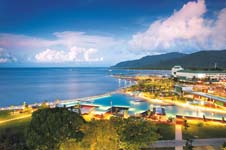QRC calls for bipartisan commitment to Resources Industry Development Plan
THE Queensland Resources Council has today repeated its call for a bipartisan commitment to a Resources Industry Development Plan to deliver more jobs, more investment and more exports for the state’s COVID-19 recovery.
“During COVID-19, QRC’s member companies kept the 372,000 Queensland men and women employed in, and because of the resources sector, safe, working and earning,” QRC chief executive Ian Macfarlane said.
“We’re pleased the Queensland Government has acknowledged the resources sector will be important to the COVID-19 recovery. We now need a firm pre-election commitment the Government will work with our sector to grow and help Queensland recover stronger and sooner.”
Mr Macfarlane said the industry development plan would focus on how to:
- expand the availability of land for mineral and energy resource exploration, development and production;
- strengthen export partnerships, create new resource export markets and increase development of advanced manufacturing and renewable energy in Queensland;
- and work together to identify and develop the skills and training needed for our resources industry and towards opportunities for diversity of employment by increasing the number of women and Indigenous Queenslanders in the industry.
The Resources Industry Development Plan is a key part of the joint QRC- AMEC (Association of Mining and Exploration Companies) Resources Industry Recovery Agenda.
Mr Macfarlane said the QRC was also seeking commitment on behalf of its member companies to streamline assessment and approval processes for resource projects, plus a 10-year hold on royalty rates and thresholds on all resource commodities.
“The LNP has already committed to a 10-year royalty hold at current levels, so we’re looking for the Queensland Government to match this commitment to give potential resource investors greater certainty around development opportunities,” he said.
“While the government has committed to a three-year hold on coal and metals, and a five-year hold on gas and petroleum, we’re looking for a longer-term commitment to match the longer timeframes it takes to plan major resource developments.”
ends
- Created on .

 How to resolve AdBlock issue?
How to resolve AdBlock issue? 